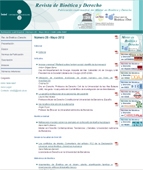Language and effective equality of women and men.
Article Sidebar

Main Article Content
Ana Rubio
Catedrática de Universidad.
The essential purpose of this article is to analyze the international and national legislation that imposes on operators a duty and responsibility to use non-sexist language. It further aims to show that we are not dealing with a minor theoretical question, but rather one that is demanded by the quality of communication and the requirement of certainty that both science-making and its correct application involve. This effort at linguistic correctness must be accompanied by the elimination of androcentrism in concepts and categories scientific-technique as an essential step in building the effective equality of men and women both formally and materially, as established by Organic Law 3/2007 of 22 March for the effective equality of women and men, art.14.11. Finally, it analyses, giving data, the efforts made by the various courts and jurisdictions in Spain in recent years to eradicate sexism in legal language, showing the plurality of resources offered by the Spanish language to end the abuse of the masculine as a false generic.
Keywords
Legal sexism, effective equality, the principle of non-discrimination, androcentrism, responsibility of the Academy, the technique of soft law.
Article Details
How to Cite
Rubio, Ana. “Language and effective equality of women and men”. Revista de bioética y derecho, no. 38, pp. 5-24, https://raco.cat/index.php/RevistaBioeticaDerecho/article/view/317154.
Rights
Copyright
The author retains the copyright and grants Revista de Bioética y Derecho the right of first publication of the article. All articles published in Revista de Bioética y Derecho are under Creative Commons licensing Recognition – Non Commercial – NoDerivedArtwork (by-nc-nd 4.0), which allows sharing the content with third parties, provided that they acknowledge its authorship, initial publication in this journal and the terms of the license. No commercial use of the original work or generation of derivative works is permitted.
Author Biography